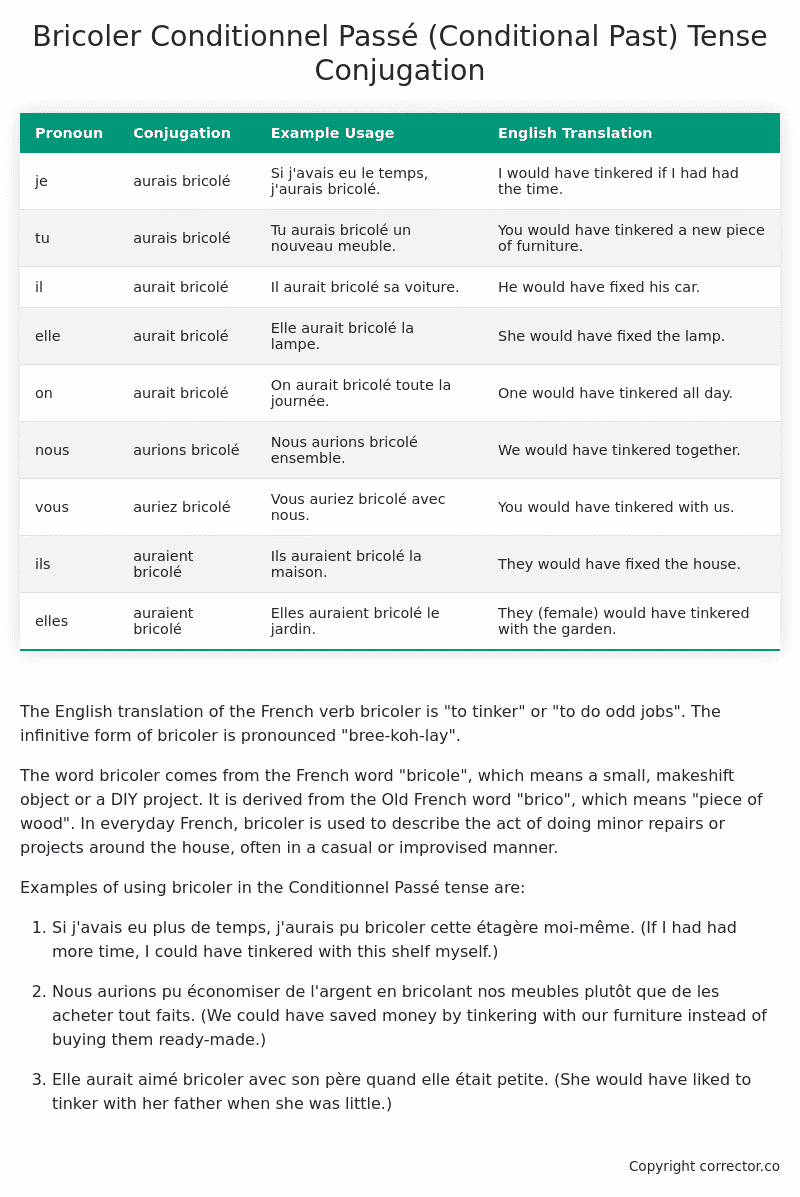Conditionnel Passé (Conditional Past) Tense Conjugation of the French Verb bricoler
Introduction to the verb bricoler
The English translation of the French verb bricoler is “to tinker” or “to do odd jobs”. The infinitive form of bricoler is pronounced “bree-koh-lay”.
The word bricoler comes from the French word “bricole”, which means a small, makeshift object or a DIY project. It is derived from the Old French word “brico”, which means “piece of wood”. In everyday French, bricoler is used to describe the act of doing minor repairs or projects around the house, often in a casual or improvised manner.
Examples of using bricoler in the Conditionnel Passé tense are:
-
Si j’avais eu plus de temps, j’aurais pu bricoler cette étagère moi-même. (If I had had more time, I could have tinkered with this shelf myself.)
-
Nous aurions pu économiser de l’argent en bricolant nos meubles plutôt que de les acheter tout faits. (We could have saved money by tinkering with our furniture instead of buying them ready-made.)
-
Elle aurait aimé bricoler avec son père quand elle était petite. (She would have liked to tinker with her father when she was little.)
Table of the Conditionnel Passé (Conditional Past) Tense Conjugation of bricoler
| Pronoun | Conjugation | Example Usage | English Translation |
|---|---|---|---|
| je | aurais bricolé | Si j’avais eu le temps, j’aurais bricolé. | I would have tinkered if I had had the time. |
| tu | aurais bricolé | Tu aurais bricolé un nouveau meuble. | You would have tinkered a new piece of furniture. |
| il | aurait bricolé | Il aurait bricolé sa voiture. | He would have fixed his car. |
| elle | aurait bricolé | Elle aurait bricolé la lampe. | She would have fixed the lamp. |
| on | aurait bricolé | On aurait bricolé toute la journée. | One would have tinkered all day. |
| nous | aurions bricolé | Nous aurions bricolé ensemble. | We would have tinkered together. |
| vous | auriez bricolé | Vous auriez bricolé avec nous. | You would have tinkered with us. |
| ils | auraient bricolé | Ils auraient bricolé la maison. | They would have fixed the house. |
| elles | auraient bricolé | Elles auraient bricolé le jardin. | They (female) would have tinkered with the garden. |
Other Conjugations for Bricoler.
Le Present (Present Tense) Conjugation of the French Verb bricoler
Imparfait (Imperfect) Tense Conjugation of the French Verb bricoler
Passé Simple (Simple Past) Tense Conjugation of the French Verb bricoler
Passé Composé (Present Perfect) Tense Conjugation of the French Verb bricoler
Futur Simple (Simple Future) Tense Conjugation of the French Verb bricoler
Futur Proche (Near Future) Tense Conjugation of the French Verb bricoler
Plus-que-parfait (Pluperfect) Tense Conjugation of the French Verb bricoler
Passé Antérieur (Past Anterior) Tense Conjugation of the French Verb bricoler
Futur Antérieur (Future Anterior) Tense Conjugation of the French Verb bricoler
Subjonctif Présent (Subjunctive Present) Tense Conjugation of the French Verb bricoler
Subjonctif Passé (Subjunctive Past) Tense Conjugation of the French Verb bricoler
Subjonctif Imparfait (Subjunctive Imperfect) Tense Conjugation of the French Verb bricoler
Subjonctif Plus-que-parfait (Subjunctive Pluperfect) Tense Conjugation of the French Verb bricoler
Conditionnel Présent (Conditional Present) Tense Conjugation of the French Verb bricoler
Conditionnel Passé (Conditional Past) Tense Conjugation of the French Verb bricoler (this article)
L’impératif Présent (Imperative Present) Tense Conjugation of the French Verb bricoler
L’infinitif Présent (Infinitive Present) Tense Conjugation of the French Verb bricoler
Struggling with French verbs or the language in general? Why not use our free French Grammar Checker – no registration required!
Get a FREE Download Study Sheet of this Conjugation 🔥
Simply right click the image below, click “save image” and get your free reference for the bricoler Conditionnel Passé tense conjugation!

Bricoler – About the French Conditionnel Passé (Conditional Past) Tense
Formation
Common Everyday Usage Patterns
Expressing Unreal Past Scenarios
Polite Requests or Suggestions
Expressing Doubt or Uncertainty
Interactions with Other Tenses
Conditional Present
Indicative Past Tenses
Conditional Future
Summary
Want More?
I hope you enjoyed this article on the verb bricoler. Still in a learning mood? Check out another TOTALLY random French verb conjugation!


